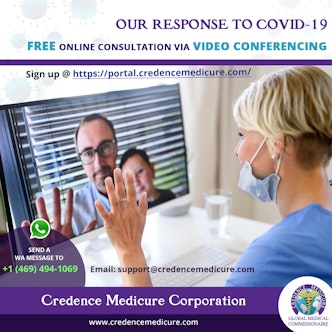Most Specializations Covered
Credence Medicure’s global reach ensures that an extensive list specializations are covered by our enlisted doctors, giving a one stop solution for the most sought after treatments.
The COVID-19 pandemic has forced all of us into an unchartered territory, affecting nearly every aspect of our daily lives. With that in mind, we at Credence pledge to keep you as informed as possible on developments on the outbreak, in addition to offering you tools and suggestions to help you weather this unexpected downturn. We'll tap into our network of specialists to offer guidance on how to manage the situation.
Please keep connected to our news & blogs and watch our social media platforms
Credence Medicure Corporation is a US Corporation providing Global Medical Commissionaire and Concierge Services for the Health Care Industry and Medical Tourism through an exclusive Online Platform
Credence Medicure Corporation has been formed in the state of Texas with a vision to be a Global Commissionaire and Concierge Service Provider for the healthcare industry. Credence has developed a portal with full Electronic Medical Record (EMR) capabilities for providing online consultation to patients through video conferencing. In addition to providing medical consultations in local areas, the prime focus of the Corporation is to develop a worldwide Medical Tourism business through the use of its proprietary technology platform.
Credence is committed to the Principles of Medical Ethics and top-notch health care services in USA. Credence neither promotes any Hospital or Chain of Hospitals nor affiliates itself with any particular physician or surgeon. Our goal is to ensure that the patient is guarded by the fundamental principle of Healthcare that relates to improvement of health via prevention, accurate diagnosis and a healing therapy. At Credence we try to safeguard the patient to the best of our abilities through our internal processes against any unnecessary medical intervention. This differentiates Credence from all other medical tourism facilitators across the globe.
Credence Medicure’s global reach ensures that an extensive list specializations are covered by our enlisted doctors, giving a one stop solution for the most sought after treatments.
Credence Medicure’s rigorous screening procedures ensure that the doctors registered on the portal are fully qualified with great experience give you the best possible treatment.
Our fully automated portal makes getting a second opinion from another experienced doctor a breeze, it is just a couple of clicks away.
There is no one better than Credence Medicure if you want to combine a pleasure trip along with your treatment, we will take care of the logistics so that you have a worry free experience.
In case you require any kind of medico-legal assistance related to your case, our team of experts is always at hand to help you out.
We have tie ups with some of the best renowned medical facilities across the globe, so whatever your requirements are, Credence Medicure is always best positioned to take care of you.

Dr Akhtar Munir
MBBS, MPH, DFM

Dr Nitin Arora
MBBS, MS, FIAGES, FALS

Dr Romesh Salhan
MBBS, MD

Dr Amit Kumar Soni
MBBS, MD, DNB, FACC, FSCAI, FESC, FICCPR

Dr Ardeshir Tehemtan Jagose
B.H.M.S, H.M.D. (U.K.), M.D. (A.M), M.D. (Hom)

Dr Channamsetty Sashidhar
MBBS, MD, DNB

Dr Dibyalochan Swain
BDS, FAGE, PGDD

Dr Gursimran Singh
MBBS, MS, F.MAS, D.MAS

Dr Kshitij Charaya
M.B.B.S, M.S (Otorhinolaryngology)

Dr Maninder Hundal
MBBS, MD

Dr MK Vedaprakash
MBBS, MS

Dr Nirmal Bhasin
MBBS, MS

Dr Rajasekhar Perumalla
MBBS, MS, DNB, PDCC, MNAMS, FRCS

Dr Sati Basavaraj Manjunath
BDS, MDS

Dr Shabana Kazi
BDS

Dr Shanmugapriya Aravinth
BDS, MDS

Dr Harjinder Singh
Doctor of Medicine (MD), BEMS, MA (Psychology)

Dr Manoj Kumar Sunar
Master of Surgery (MS), MBBS

Dr Manpal Narula
Master of Surgery (MS), MBBS

Dr Heena Chawla
Doctor of Medicine (MD), MBBS

Dr Pawan Kansal
Doctor of Medicine (MD), MBBS

Dr Ashwani Bansal
Magister Chirurgiae (M.Ch.), MBBS, MS, ECFMG (USA)

Dr Puneet Rana Arora
Master of Surgery (MS), MBBS, DFFP, MRCOG, MSc (Reproduction & Development)

Dr Alka Mehta
Doctor of Medicine (MD), MBBS

Dr Amit Singh Brar
BDS, MDS

Dr Shafqat Ullah
MBBS, MD, DSC

Dr Shanujeet Kaur
Doctor of Medicine (MD), MBBS

Dr Sunny Singh Ahluwalia
BDS, MDS

Dr Priyadarshi Ranjan
MCh (Magister-de-chirurgie), MBBS, MS

Dr Arun Kochar
Doctorate of Medicine (DM), MBBS, MD, DNB

Dr Dheeraj KV
Master of Physical Therapy (MPT), BPT

Dr Charanpreet Singh Grewal
MBBS, MD, DM

Dr Keerthana
BDS

Dr Mir Jawad Zar Khan
MBBS, MS, M.Ch

Dr Neeraj Singla
MBBS, MD

Dr Rajeev Gupta
MBBS, MS

Dr Ritika Khanna
Master of Dental Surgery (MDS), BDS

Dr Sarabjit Romana
B.Sc, M.Sc, Ph. D

Dr Sasmit Chaudhari
BDS, MDS

Dr Subhash Jangid
MBBS, MS, DNB, MRCH, MCh

Dr Veena Joshi
MBBS, MD

Dr Hardev Ramandeep Singh Girn
Doctor of Medicine (MD), MBBS, FRCS, MRCS, CCT (UK)

Dr Vivek Sekhri
Master of Surgery ( MS), MBBS

Dr Guneet Mann
MBBS, MS (Ophthalmology), MD

Dr Shaista Sibghat
MBBS

Dr Deepak Tyagi
Magister Chirurgiae (MCh), MBBS, MS

Dr Manisha Arora
Master of Surgery (MS), MBBS

Dr Renubala Rout
DNB, MBBS
ADVISORY

Vaccine is a suspension of weakened, killed, or fragmented virus or bacterium or an isolated subunit of the infectious agent, or a recombinant protein …
Read More →MEDICAL CARE & TRAVEL

Sitting on your couch, binge-eating your favourite comfort food, does the worry of gaining all those extra pounds make you shudder? There’s no need to …
Read More →CREDENCE MEDICURE

Continuing its contribution towards fighting the COVID-19 pandemic, Credence Medicure Corporation, a Dallas Texas USA, based Telemedicine and Medical …
Read More →